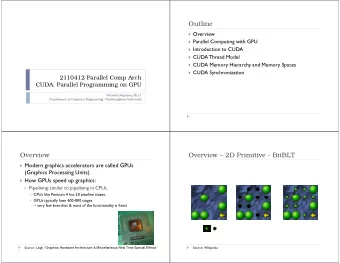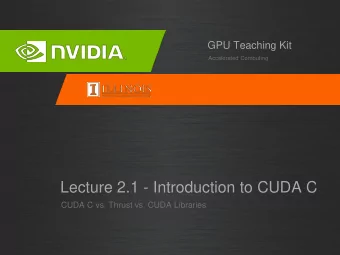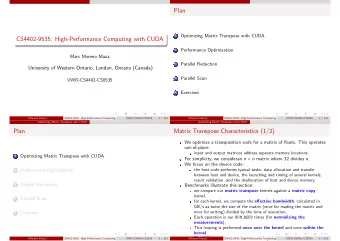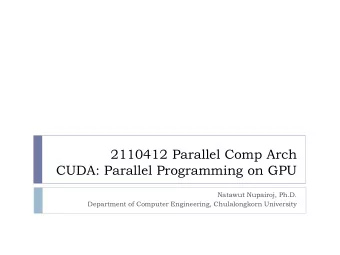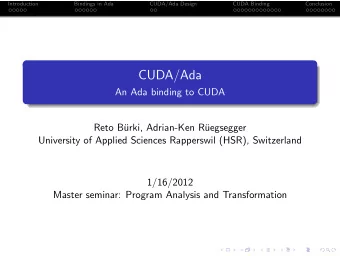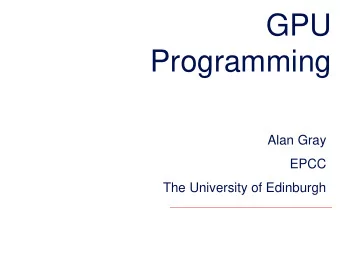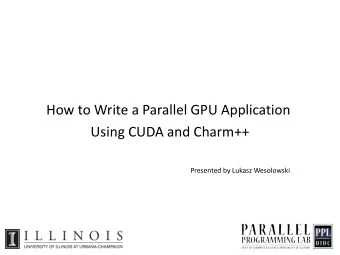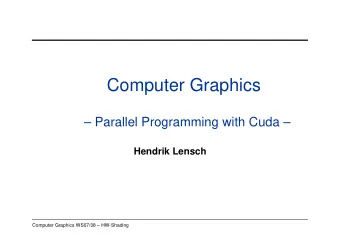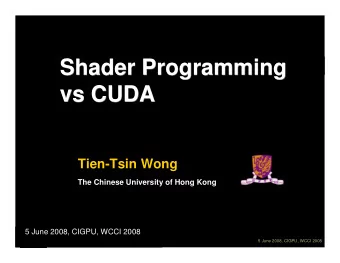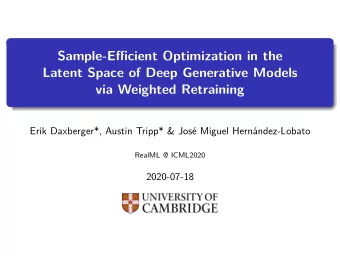
Optimizing Parallel Reduction in CUDA Mark Harris NVIDIA Developer - PowerPoint PPT Presentation
Optimizing Parallel Reduction in CUDA Mark Harris NVIDIA Developer Technology http://developer.download.nvidia.com/assets/cuda/files/reduction.pdf Tuesday, September 11, 12 Parallel Reduction Tree-based approach used within each thread block
Optimizing Parallel Reduction in CUDA Mark Harris NVIDIA Developer Technology http://developer.download.nvidia.com/assets/cuda/files/reduction.pdf Tuesday, September 11, 12
Parallel Reduction Tree-based approach used within each thread block 3 1 7 0 4 1 6 3 4 7 5 9 11 14 25 Need to be able to use multiple thread blocks To process very large arrays To keep all multiprocessors on the GPU busy Each thread block reduces a portion of the array But how do we communicate partial results between thread blocks? 3 Tuesday, September 11, 12
Solution: Kernel Decomposition Avoid global sync by decomposing computation into multiple kernel invocations 3 1 7 0 4 1 6 3 3 1 7 0 4 1 6 3 3 1 7 0 4 1 6 3 3 1 7 0 4 1 6 3 3 1 7 0 4 1 6 3 3 1 7 0 4 1 6 3 3 1 7 0 4 1 6 3 3 1 7 0 4 1 6 3 4 7 5 9 4 7 5 9 4 7 5 9 4 7 5 9 4 7 5 9 4 7 5 9 4 7 5 9 4 7 5 9 11 14 11 14 11 14 11 14 11 14 11 14 11 14 11 14 Level 0: 25 25 25 25 25 25 25 25 8 blocks Level 1: 3 1 7 0 4 1 6 3 4 7 5 9 1 block 11 14 25 In the case of reductions, code for all levels is the same Recursive kernel invocation 5 Tuesday, September 11, 12
What is Our Optimization Goal? We should strive to reach GPU peak performance Choose the right metric: GFLOP/s: for compute-bound kernels Bandwidth: for memory-bound kernels Reductions have very low arithmetic intensity 1 flop per element loaded (bandwidth-optimal) Therefore we should strive for peak bandwidth Will use G80 GPU for this example 384-bit memory interface, 900 MHz DDR 384 * 1800 / 8 = 86.4 GB/s Jinx (m2090 nodes) ~ 100 to 150 GB/s? 6 Tuesday, September 11, 12
Parallel Reduction: Interleaved Addressing 10 1 8 -1 0 -2 3 5 -2 -3 2 7 0 11 0 2 Values (shared memory) Tuesday, September 11, 12
Parallel Reduction: Interleaved Addressing 10 1 8 -1 0 -2 3 5 -2 -3 2 7 0 11 0 2 Values (shared memory) Step 1 Thread 2 4 6 8 10 12 14 0 Stride 1 IDs Values 11 1 7 -1 -2 -2 8 5 -5 -3 9 7 11 11 2 2 Step 2 Thread 4 8 12 0 Stride 2 IDs Values 18 1 7 -1 6 -2 8 5 4 -3 9 7 13 11 2 2 Step 3 Thread 8 0 Stride 4 IDs Values 24 1 7 -1 6 -2 8 5 17 -3 9 7 13 11 2 2 Step 4 Thread 0 Stride 8 IDs Values 41 1 7 -1 6 -2 8 5 17 -3 9 7 13 11 2 2 8 Tuesday, September 11, 12
Reduction #1: Interleaved Addressing __global__ void reduce0(int *g_idata, int *g_odata) { extern __shared__ int sdata[]; // each thread loads one element from global to shared mem unsigned int tid = threadIdx.x; unsigned int i = blockIdx.x*blockDim.x + threadIdx.x; sdata[tid] = g_idata[i]; __syncthreads(); // do reduction in shared mem for(unsigned int s=1; s < blockDim.x; s *= 2) { if (tid % (2*s) == 0) { sdata[tid] += sdata[tid + s]; } __syncthreads(); } // write result for this block to global mem if (tid == 0) g_odata[blockIdx.x] = sdata[0]; } 7 Tuesday, September 11, 12
Performance for 4M element reduction Time (2 22 ints) Bandwidth Kernel 1: 8.054 ms 2.083 GB/s interleaved addressing with divergent branching Note: Block Size = 128 threads for all tests Jinx: Kernel ~ Bandwidth Kernel 1 ~ 10.6 GB/s 10 Tuesday, September 11, 12
Reduction #1: Interleaved Addressing __global__ void reduce1(int *g_idata, int *g_odata) { extern __shared__ int sdata[]; // each thread loads one element from global to shared mem unsigned int tid = threadIdx.x; unsigned int i = blockIdx.x*blockDim.x + threadIdx.x; sdata[tid] = g_idata[i]; __syncthreads(); // do reduction in shared mem for (unsigned int s=1; s < blockDim.x; s *= 2) { if (tid % (2*s) == 0) { Problem: highly divergent sdata[tid] += sdata[tid + s]; warps are very inefficient, and } % operator is very slow __syncthreads(); } // write result for this block to global mem if (tid == 0) g_odata[blockIdx.x] = sdata[0]; } 9 Tuesday, September 11, 12
Parallel Reduction: Interleaved Addressing 10 1 8 -1 0 -2 3 5 -2 -3 2 7 0 11 0 2 Values (shared memory) Step 1 Thread 2 4 6 8 10 12 14 0 Stride 1 IDs Values 11 1 7 -1 -2 -2 8 5 -5 -3 9 7 11 11 2 2 Step 2 Thread 4 8 12 0 Stride 2 IDs Values 18 1 7 -1 6 -2 8 5 4 -3 9 7 13 11 2 2 Step 3 Thread 8 0 Stride 4 IDs Values 24 1 7 -1 6 -2 8 5 17 -3 9 7 13 11 2 2 Step 4 Thread 0 Stride 8 IDs Values 41 1 7 -1 6 -2 8 5 17 -3 9 7 13 11 2 2 8 Tuesday, September 11, 12
Parallel Reduction: Interleaved Addressing 10 1 8 -1 0 -2 3 5 -2 -3 2 7 0 11 0 2 Values (shared memory) Step 1 Thread 1 2 3 4 5 6 7 0 Stride 1 IDs Values 11 1 7 -1 -2 -2 8 5 -5 -3 9 7 11 11 2 2 Step 2 Thread 1 2 3 0 Stride 2 IDs Values 18 1 7 -1 6 -2 8 5 4 -3 9 7 13 11 2 2 Step 3 Thread 1 0 Stride 4 IDs Values 24 1 7 -1 6 -2 8 5 17 -3 9 7 13 11 2 2 Step 4 Thread 0 Stride 8 IDs Values 41 1 7 -1 6 -2 8 5 17 -3 9 7 13 11 2 2 New Problem: Shared Memory Bank Conflicts 12 Tuesday, September 11, 12
Reduction #2: Interleaved Addressing Just replace divergent branch in inner loop: for (unsigned int s=1; s < blockDim.x; s *= 2) { if (tid % (2*s) == 0) { sdata[tid] += sdata[tid + s]; } __syncthreads(); } With strided index and non-divergent branch: for (unsigned int s=1; s < blockDim.x; s *= 2) { int index = 2 * s * tid; if (index < blockDim.x) { sdata[index] += sdata[index + s]; } __syncthreads(); } 11 Tuesday, September 11, 12
Performance for 4M element reduction Step Cumulative Time (2 22 ints) Bandwidth Speedup Speedup Kernel 1: 8.054 ms 2.083 GB/s interleaved addressing with divergent branching Kernel 2: 3.456 ms 4.854 GB/s 2.33x 2.33x interleaved addressing with bank conflicts Jinx: Kernel ~ Bandwidth → Speedup Kernel 1 ~ 10.6 GB/s Kernel 2 ~ 16.4 GB/s → 1.55x 13 Tuesday, September 11, 12
Parallel Reduction: Interleaved Addressing 10 1 8 -1 0 -2 3 5 -2 -3 2 7 0 11 0 2 Values (shared memory) Step 1 Thread 1 2 3 4 5 6 7 0 Stride 1 IDs Values 11 1 7 -1 -2 -2 8 5 -5 -3 9 7 11 11 2 2 Step 2 Thread 1 2 3 0 Stride 2 IDs Values 18 1 7 -1 6 -2 8 5 4 -3 9 7 13 11 2 2 Step 3 Thread 1 0 Stride 4 IDs Values 24 1 7 -1 6 -2 8 5 17 -3 9 7 13 11 2 2 Step 4 Thread 0 Stride 8 IDs Values 41 1 7 -1 6 -2 8 5 17 -3 9 7 13 11 2 2 New Problem: Shared Memory Bank Conflicts 12 Tuesday, September 11, 12
0 1 2 3 4 5 6 7 8 9 Array Example : Array mapped to 4 banks. Maximum throughput occurs when delivering 1 word per bank. 0 1 2 3 Shared memory 4 5 6 7 8 9 Tuesday, September 11, 12
Parallel Reduction: Sequential Addressing Values (shared memory) 10 1 8 -1 0 -2 3 5 -2 -3 2 7 0 11 0 2 Thread Step 1 IDs Stride 8 1 2 3 4 5 6 7 0 Values 8 -2 10 6 0 9 3 7 -2 -3 2 7 0 11 0 2 Step 2 Thread Stride 4 IDs 1 2 3 0 Values 8 7 13 13 0 9 3 7 -2 -3 2 7 0 11 0 2 Step 3 Thread 1 0 Stride 2 IDs Values 21 20 13 13 0 9 3 7 -2 -3 2 7 0 11 0 2 Thread Step 4 0 IDs Stride 1 Values 41 20 13 13 0 9 3 7 -2 -3 2 7 0 11 0 2 Sequential addressing is conflict free 14 Tuesday, September 11, 12
Reduction #3: Sequential Addressing Just replace strided indexing in inner loop: for (unsigned int s=1; s < blockDim.x; s *= 2) { int index = 2 * s * tid; if (index < blockDim.x) { sdata[index] += sdata[index + s]; } __syncthreads(); } With reversed loop and threadID-based indexing: for (unsigned int s=blockDim.x/2; s>0; s>>=1) { if (tid < s) { sdata[tid] += sdata[tid + s]; } __syncthreads(); } 15 Tuesday, September 11, 12
Performance for 4M element reduction Step Cumulative Time (2 22 ints) Bandwidth Speedup Speedup Kernel 1: 8.054 ms 2.083 GB/s interleaved addressing with divergent branching Kernel 2: 3.456 ms 4.854 GB/s 2.33x 2.33x interleaved addressing with bank conflicts Kernel 3: 1.722 ms 9.741 GB/s 2.01x 4.68x sequential addressing Jinx: Kernel ~ Bandwidth → Speedup (Cumulative speedup) Kernel 1 ~ 10.6 GB/s Kernel 2 ~ 16.4 GB/s → 1.55x Kernel 3 ~ 22.3 GB/s → 1.35x (2.10x) 16 Tuesday, September 11, 12
Idle Threads Problem: for (unsigned int s=blockDim.x/2; s>0; s>>=1) { if (tid < s) { sdata[tid] += sdata[tid + s]; } __syncthreads(); } Half of the threads are idle on first loop iteration! This ¡is ¡wasteful… 17 Tuesday, September 11, 12
Reduction #4: First Add During Load Halve the number of blocks, and replace single load: // each thread loads one element from global to shared mem unsigned int tid = threadIdx.x; unsigned int i = blockIdx.x*blockDim.x + threadIdx.x; sdata[tid] = g_idata[i]; __syncthreads(); With two loads and first add of the reduction: // perform first level of reduction, // reading from global memory, writing to shared memory unsigned int tid = threadIdx.x; unsigned int i = blockIdx.x*(blockDim.x*2) + threadIdx.x; sdata[tid] = g_idata[i] + g_idata[i+blockDim.x]; __syncthreads(); 18 Tuesday, September 11, 12
Recommend
More recommend
Explore More Topics
Stay informed with curated content and fresh updates.
